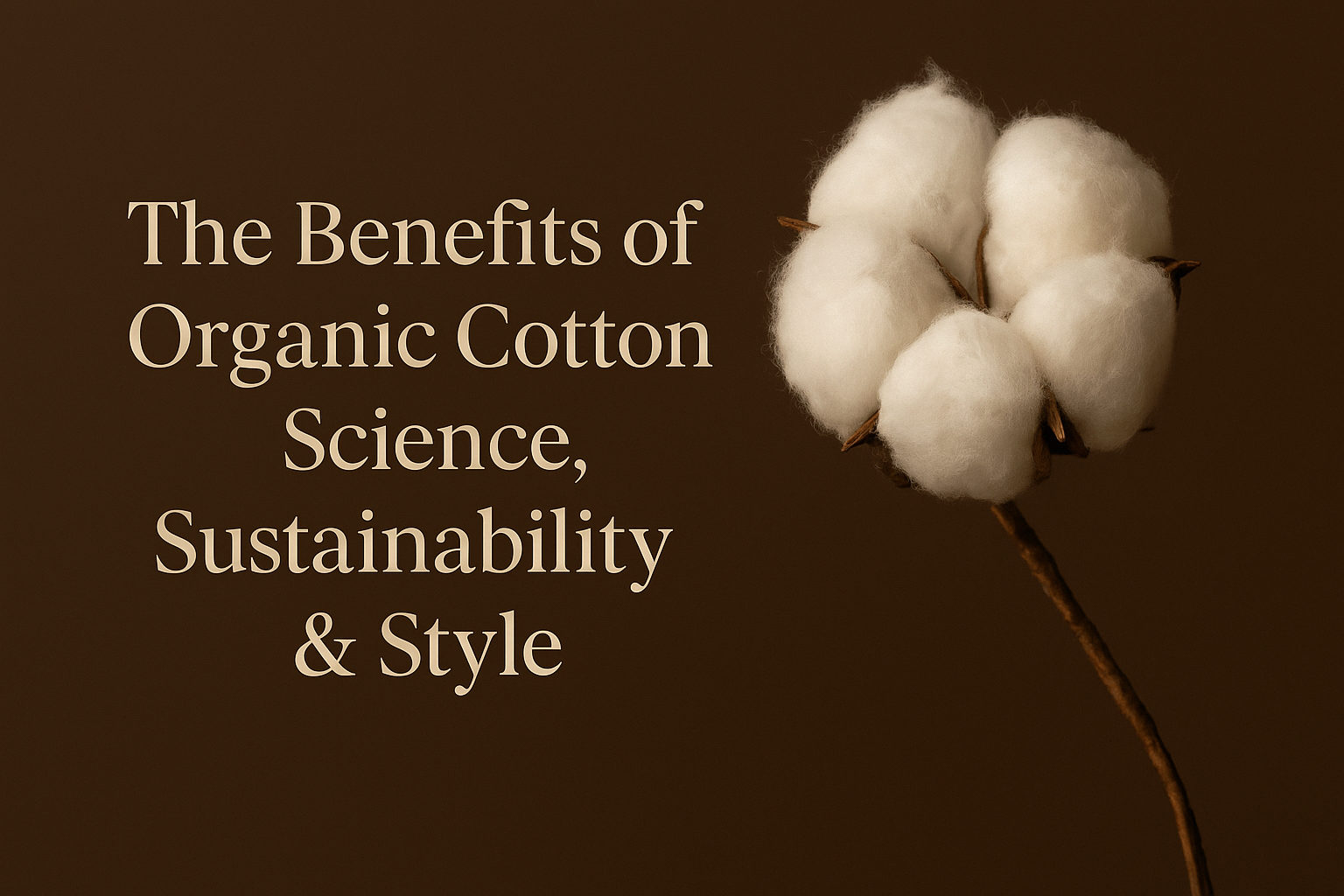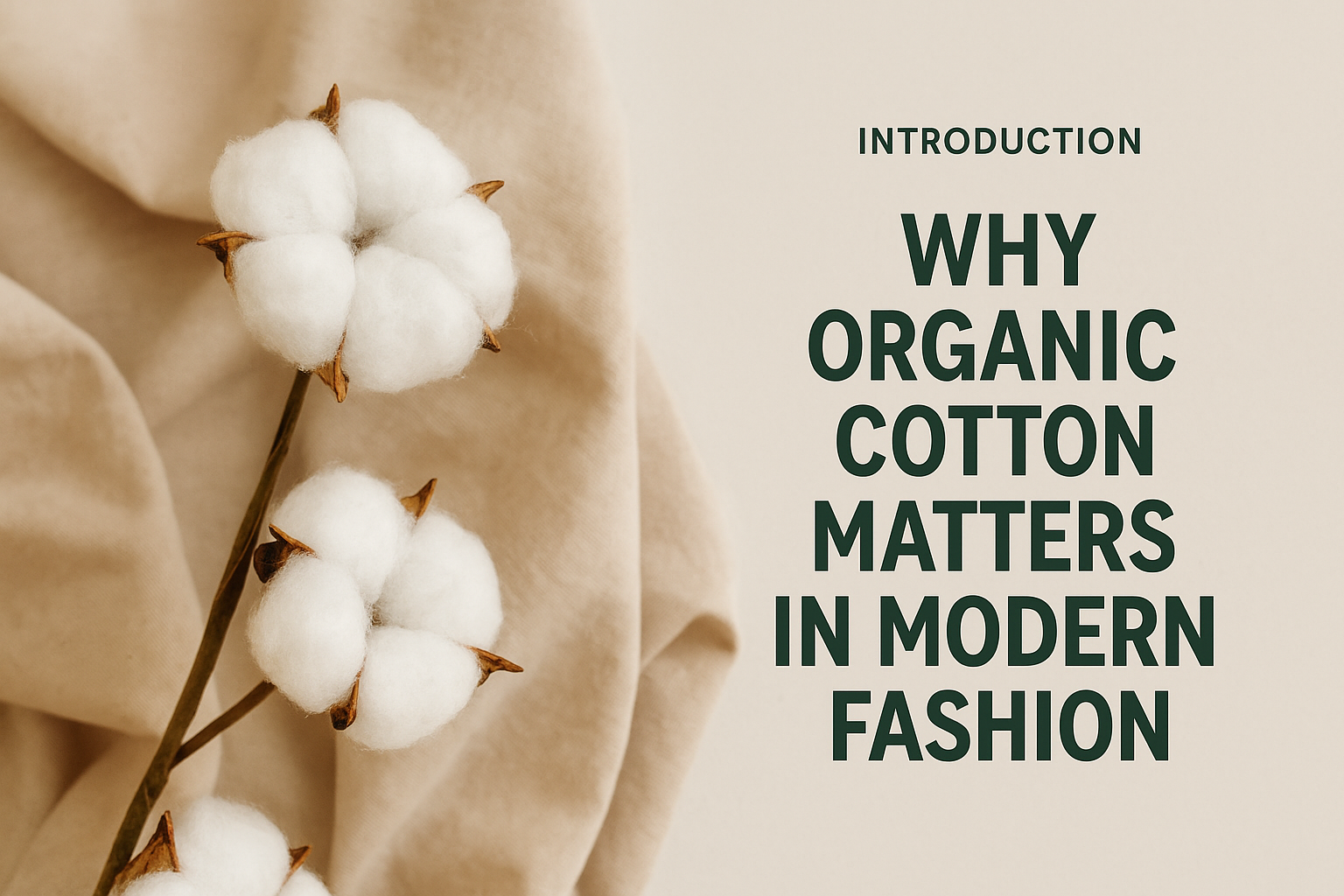Article: The Benefits of Organic Cotton: Science, Sustainability & Style (2025 Edition)

The Benefits of Organic Cotton: Science, Sustainability & Style (2025 Edition)
Why Organic Cotton Matters in Luxury Fashion
Benefits of Organic cotton is more than just a trend—it represents a fundamental shift in how we view luxury clothing. At Signature12, every garment is made with GOTS-certified Organic Peruvian Pima cotton. Unlike conventional cotton, which relies heavily on pesticides and industrial fertilizers, organic cotton is grown under strict ecological and ethical standards.
This article explores the science-backed benefits of organic cotton, from environmental impact to skin health, farmer livelihoods, and product longevity—plus how to verify if what you’re buying is genuinely organic.
1. Defining Organic Cotton
Organic cotton must meet internationally recognized farming standards (IFOAM family). This means:
-
No synthetic pesticides or fertilizers
-
No genetically modified seeds (GMO-free)
-
Soil regeneration practices (compost, crop rotation, natural pest management)
-
Fair treatment of farmers under organic and often Fairtrade schemes
In textiles, the gold standard is GOTS (Global Organic Textile Standard). Unlike labels that only verify content, GOTS goes further by ensuring:
-
Chemical restrictions on dyes and finishing agents
-
Functional wastewater treatment
-
Social compliance aligned with ILO conventions
Signature12 ensures every garment, from our Organic Stretch Crewneck to our Organic Pima Cotton Polo is crafted under this certification.
2. Environmental Benefits: Fact vs Fiction
Lower Climate Impact
A global Life Cycle Assessment found that organic cotton offers significant reductions compared to conventional cotton:
-
46% lower global warming potential
-
91% less irrigation water (blue water)
-
70% lower acidification potential
-
26% less eutrophication
This is largely due to the absence of synthetic fertilizers and reliance on rain-fed systems. By contrast, conventional cotton often relies on intensive irrigation, depleting water tables (e.g., the Aral Sea disaster).
That’s why our Signature12 Organic Cotton T-Shirts are sourced exclusively from rain-fed Peruvian valleys, minimizing water impact.
Healthier Soil, Richer Biodiversity
Organic cotton farming improves soil organic matter, boosting water retention and biodiversity. A meta-analysis found organic fields support ~30% more species richness than conventional ones.
At Signature12, our Peruvian cotton farms integrate crop rotation and hand-harvesting, preserving soil fertility and ensuring exceptional fiber quality.
Chemical-Free Ecosystems
Conventional cotton accounts for nearly 10% of global insecticide use. By contrast, organic avoids synthetic pesticides altogether. This protects waterways, farm workers, and surrounding ecosystems.
Choosing organic is a direct vote for cleaner rivers and safer farming communities.
3. Health & Skin Benefits
Fewer Chemical Residues on Fabric
Conventional cotton fabrics may be treated with:
-
Formaldehyde-based resins (for “wrinkle resistance”)
-
Heavy metal dyes
-
PFCs (for water repellency)
These are linked to contact dermatitis and respiratory irritation. GOTS prohibits these chemicals, requiring strict RSL (Restricted Substances List) and MRSL (Manufacturing Restricted Substances List) compliance.
Our Signature12 Organic V-Neck uses only low-impact dyes and certified finishing, making it safer for sensitive skin.
Breathability & Comfort
Organic cotton maintains cotton’s natural moisture-wicking and hypoallergenic qualities. With Pima’s extra-long staple fibers, Signature12 garments feel silkier, stronger, and more breathable than typical cotton basics.
4. Microfiber Pollution: Cotton vs Polyester
All fabrics shed fibers, but there’s a critical difference:
-
Polyester sheds microplastics that persist in oceans and sediments.
-
Cotton fibers are cellulosic and biodegrade rapidly in water and soil.
By choosing organic cotton, Signature12 customers reduce their impact on the global microplastic crisis. Read more in our sustainable fabrics guide
5. Farmer Livelihoods & Ethical Impact
Organic farming often yields slightly less cotton (~14–20% lower on average). But this is offset by:
-
Lower input costs (no expensive chemical fertilizers/pesticides)
-
Premiums for certified organic cotton
-
Safer working conditions
Field studies in India show organic farmers report fewer acute pesticide-related health issues and greater long-term well-being.
When you purchase from Signature12, you support family-owned Peruvian farms who are paid premium wages for their expertise and artistry.
6. Product Quality & Longevity
Fiber Integrity
Pima cotton, especially when hand-harvested, produces extra-long staple (ELS) fibers. These fibers:
-
Resist pilling
-
Retain color vibrancy
-
Soften with wear, without losing structure
Our Organic Stretch Crewneck is pre-shrunk to maintain fit even after dozens of washes.
Durability vs Fast Fashion
Fast fashion cotton blends often sacrifice longevity for price. By contrast, Signature12 invests in slow luxury essentials—timeless pieces designed to outlast trends.
7. How to Verify Authentic Organic Cotton
Greenwashing is rampant. To ensure authenticity:
-
Look for GOTS certification on the label.
-
Verify the license number in the GOTS public database.
-
For bulk purchases, request Transaction Certificates.
-
Pair OCS labels with chemical standards for full coverage.
Signature12 publishes certifications openly in our sustainability section
8. Myths About Organic Cotton
-
“It always uses less water.” → Not always true; depends on irrigation vs rainfall.
-
“It’s less durable.” → Wrong when using ELS fibers like Pima.
-
“It’s just marketing.” → Verified certification and supply chain transparency prove otherwise.
| Anchor Text | URL | Section |
|---|---|---|
| GOTS-certified Organic Peruvian Pima cotton | /collections/mens-organic-cotton-tshirts | Intro |
| Signature12 Organic Stretch Crewneck | /products/organic-cotton-stretch-crewneck | Environmental |
| Organic Pima Cotton Polo | /products/organic-pima-cotton-polo | Environmental |
| Family-run Peruvian workshops | /pages/our-story | Environmental/Farmers |
| Sustainability practices | /pages/sustainability | Myths & How to Shop Smart |
| Organic V-Neck Tee | /products/organic-cotton-v-neck | Health & Comfort |
| Guide to Pima cotton | /pages/why-pima-cotton | Comfort & Quality |
| Quiet luxury T-shirt collection | /collections/mens-organic-cotton-tshirts | Durability |
| Sustainable fabrics guide | /blogs/news | Microfiber Pollution |

